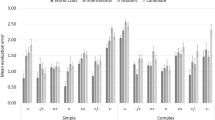Summary
In two experiments the structure of knowledge representation in chess experts and average players was examined. Pattern-recognition theory explains expertise through the existence of many small, unrelated knowledge units. Recent research stresses the structure of knowledge representations. However, the standard paradigm does not allow for the detection of relations between chunks; the theoretical shift has to be accompanied by a methodological shift. In Experiment 1, by means of a partitioning task, evidence was provided for a hierarchical representation of chess positions. Chess masters formed larger and more complex knowledge units than average players. In Experiment 2, the typicality of the positions was varied. The more typical the positions were, the larger and more coherent the constructed knowledge units were. The greatest differences between both groups occurred in more typical positions. This reflects the experts' ability to relate several knowledge units with one another.
Similar content being viewed by others
References
Charness, N. (1976). Memory for chess positions: Resistance to interference.Journal of Experimental Psychology, 2, 641–653.
Chase, W. G., & Ericsson, K. A. (1982). Skill and working memory. In G. H. Bower (Ed.),The psychology of learning and motivation (Vol. 16, pp. 1–58). New York: Academic Press.
Chase, W. G., & Simon, H. A. (1973a). Perception in chess.Cognitive Psychology, 4, 55–81.
Chase, W. G., & Simon, H. A. (1973b). The mind's eye in chess. In W. G. Chase (Ed.),Visual information processing (pp. 215–281). New York: Academic Press.
Chi, M. T. H. (1978). Knowledge structures and memory development. In R. S. Siegler (Ed.),Children's thinking: What develops? (pp. 73–96). Hillsdale, NJ: Erlbaum.
Chi, M. T. H., Feltovich, P. J., & Glaser, R. (1981). Categorization and representation of physics problems by experts and novices.Cognitive Science, 5, 121–152.
Chi, M. T. H., Glaser, R., & Rees, E. (1982). Expertise in problem solving. In R. J. Sternberg (Ed.),Advances in the psychology of human intelligence (Vol. 1, pp. 7–75). Hillsdale, NJ: Erlbaum.
de Groot, A. D. (1946).Her denken van den schaker. Amsterdam: North Holland.
de Groot, A. D. (1956). Über das Denken der Schachspieler.Rivista di Psicologia, 50, 73–104.
de Groot, A. D. (1965).Thought and choice in chess. The Hague: Mouton.
de Groot, A. D. (1966). Perception and memory versus thought: Some old ideas and recent findings. In B. Kleinmuntz (Ed.),Problem solving: Research, method and theory (pp. 19–50). New York: Wiley.
de Groot, A. D. (1981). Thought and choice in chess. In N. H. Frijda & A. D. de Groot (Eds.),Otto Selz: His contribution to psychology (pp. 192–255). The Hague: Mouton.
Egan, D. E., & Schwartz, E. J. (1979). Chunking in recall of symbolic drawings.Memory & Cognition, 7, 149–158.
Ericsson, K. A. (1985). Memory skill.Canadian Journal of Psychology, 39, 188–231.
Ericsson, K. A., Chase, W. G., & Faloon, S. (1980). Acquisition of a memory skill.Science, 208, 1181–1182.
Ericsson, K. A., & Staszewski, J. J. (1989). Skilled memory and expertise: Mechanisms of exceptional performance. In D. Klahr & K. Kotovsky (Eds.),Complex information processing: The impact of Herbert A. Simon (pp. 235–267). Hillsdale, NJ: Erlbaum.
Frey, P. W., & Adesman, P. (1976). Recall memory for visually presented chess positions.Memory & Cognition, 4, 541–547.
Goldin, S. E. (1978). Memory for the ordinary: Typicality effects in chess memory.Journal of Experimental Psychology: Human Learning and Memory, 4, 605–611.
Gruber, H. (1991).Qualitative Aspekte von Expertise im Schach [Qualitative aspects of expertise in chess]. Unpublished doctoral dissertation, Ludwig-Maximilians-University, Munich.
Gruber, H., & Ziegler, A. (in press). Expertisegrad und Wissensbasis [Level of expertise and knowledge base]. Psychologische Beiträge.
Holding, D. H. (1985).The psychology of chess skill. Hillsdale, NJ: Erlbaum.
Lesgold, A. M. (1984). Acquiring expertise. In J. R. Anderson & M. Kosslyn (Eds.),Tutorials in learning and memory (pp. 31–60). San Francisco: Freeman.
Lories, G. (1987). Recall of random and non random chess positions in strong and weak chess players.Psychologica Belgica, 27, 153–159.
Miller, G. A. (1956). The magical number seven, plus or minus two: Some limits on our capacity for processing information.Psychological Review, 63, 81–97.
Novick, L. R. (1988). Analogical transfer, problem similarity and expertise.Journal of Experimental Psychology: Learning, Memory, and Cognition, 14, 510–520.
Reitman, J. S. (1976). Skilled perception in Go: Deducing memory structures from inter-response times.Cognitive Psychology, 8, 336–356.
Saariluoma, P. (1989). Chess players' recall of auditorily presented chess positions.European Journal of Cognitive Psychology, 1, 309–320.
Simon, H. A., & Chase, W. G. (1973). Skill in chess.American Scientist, 61, 394–403.
Simon, H. A., & Gilmartin, K. (1973). A simulation of memory for chess positions.Cognitive Psychology, 5, 29–46.
Staszewski, J. J. (1990). Exceptional memory: The influence of practice and knowledge on the development of elaborative encoding strategies. In W. Schneider & F. E. Weinert (Eds.),Interactions among aptitudes, strategies, and knowledge in cognitive performance (pp. 252–285). New York: Springer.
Williamson, J., & McGuinness, C. (1990). The role of schemata in the comprehension of maps. In K. J. Gilhooly, M. T. G. Keane, R. H. Logie, & G. Erdos (Eds.),Lines of thinking: Reflections on the psychology of thought (Vol. 2, pp. 29–40). Chichester: Wiley.
Author information
Authors and Affiliations
Rights and permissions
About this article
Cite this article
Freyhof, H., Gruber, H. & Ziegler, A. Expertise and hierarchical knowledge representation in chess. Psychol. Res 54, 32–37 (1992). https://doi.org/10.1007/BF01359221
Issue Date:
DOI: https://doi.org/10.1007/BF01359221




